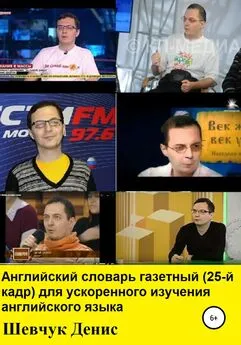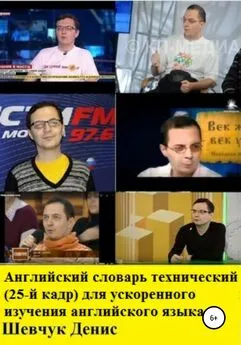Денис Шевчук - Английский язык: самоучитель
- Название:Английский язык: самоучитель
- Автор:
- Жанр:
- Издательство:неизвестно
- Год:неизвестен
- ISBN:нет данных
- Рейтинг:
- Избранное:Добавить в избранное
-
Отзывы:
-
Ваша оценка:
Денис Шевчук - Английский язык: самоучитель краткое содержание
Книга предназначена для всех желающих быстро освоить английский язык. Она может быть полезна поступающим в вузы (абитуриентам), студентам, преподавателям, бизнесменам, туристам и всем, имеющим контакты с зарубежными партнерами. Она может быть полезна как начинающим, так и продолжающим изучать английский язык.
Также даются полезные советы для прохождения интервью при приеме на работу.
Пособие разработано на базе многолетней практики преподавания английского языка по методике дистанционного образования. С его помощью можно получить достаточные знания и навыки для адекватного поведения в различных ситуациях бытового и делового общения. Active Vocabulary - новые слова и выражения урока, речевые образцы и их детальная отработка; Active Grammar - объяснение грамматики урока и упражнения на отработку данных грамматических явлений с использованием новой лексики урока; Reading and Speaking Practice - упражнения, нацеленные на отработку навыков чтения и говорения с использованием изученной лексики и грамматики; Assignment - письменное задание, составленное в форме теста. Материал уроков систематизирован по темам, названия которых приводятся в начале каждого урока. Одним из достоинствпособия является постоянная систематизация изучаемой лексики и грамматики, что позволяет максимально облегчить процесс обучения. Для повышения эффективности обучения рекомендуем выполнять упражнения, проговаривая их вслух, пересказывая все тексты и диалоги. Старайтесь произносить слова, фразы и диалоги громко, обращая особенное внимание на интонацию. При необходимости используйте компьютерные словари, дающие правильные варианты произношения слов, а также много слушайте аудио и видеозаписи, вообще голос носителей.
Английский язык: самоучитель - читать онлайн бесплатно ознакомительный отрывок
Интервал:
Закладка:
Заполните таблицу. Составьте предложения, используя предложенные грамматические структуры. Используйте данные слова .
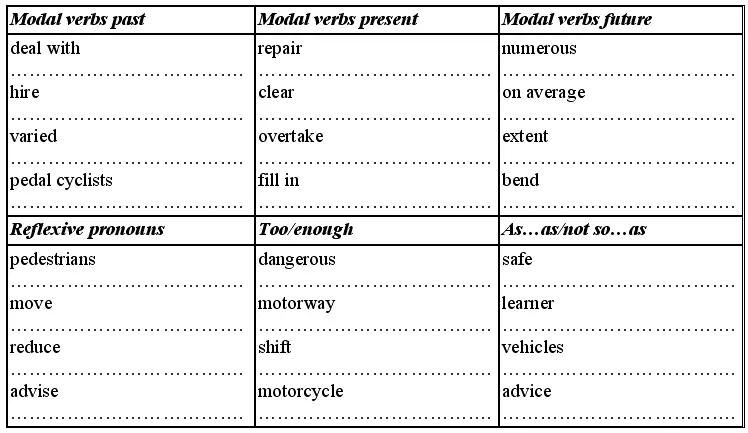
READINGAND SPEAKING PRACTICE
1. Answer the questions.
Ответьте на вопросы.
1. What does the sign no entry mean?
2. When must we give way to other vehicles?
3. On which pieces of road is there no overtaking?
4. What do drivers have to do at the T-junction?
5. Where and when do drivers have to reduce speed?
6. If the brakes don’t work what must the driver do at once?
7. Why is it difficult to park a car in the centre of a city?
8. Do you have to deal with numerous people from numerous walks of life?
9. What do police cater for?
10. Why do we sometimes have to rent a car?
11. What is the most important thing for a learner driver?
2. Agree or disagree. Use different expressions.
Выразите согласие или несогласие. Используйте различные речевые образцы .
1. There are too many cars in the city streets now.
2. The job of a policeman is boring.
3. Police don’t allow agricultural vehicles to drive in city streets.
4. On average every family in Russia has a car.
5. The police cater for all the people they have to deal with.
6. Pedal cyclists can’t ride along the streets of Moscow.
7. People of numerous walks of life use city transport.
3. Speak about some of the places in your town. Say where they are, how you can drive there, what signs you can see on the way there.
Расскажите о некоторых местах в своем городе. Скажите, где они находятся, как можно проехать туда на машине, какие дорожные знаки встречаются на пути.
...
...
4. Make up short stories using the words from the Active Vocabulary.
Составьте небольшие рассказы, используя данные слова.
A. to advise, to move, in a hurry, on average, motorway, danger;
B. learner, dangerous, ready, to overtake, agricultural vehicles, varied, to repair;
C. to allow, to give way, pedestrian, numerous, bend, shift, to flow, safe;
D. to hire, to reduce speed, to fill in, motorcycle, to follow advice, crossing, to enter, numerous walks of life.
5. Read the dialogues and try to learn them.
Прочитайте диалог и постарайтесь его запомнить.
Ijulia: excuse me.
Policeman: Yes, madam?
Julia: Could you tell me the way to South Street, please?
Policeman: Of course. Turn right here. It’s the second on the right.
Julia: Thank you.
Policeman: Oh, madam. You can’t park here.
Julia: But I won’t be long. I’ll only be a few minutes.
Policeman: Sorry, madam. You’ll have to move it. You are parked on a yellow line. And there’s the sign. Look.
Julia: Ten minutes. I’m in a hurry. I have to go back to work.
Policeman: Sorry, madam. You’ll have to use the car park.
Julia: Do I have to use the car park?
Policeman: Yes. This is a No Parking area.
Julia: And where is the car park.
Policeman: It’s not far from here. Turn right, drive along Dane Street and you are there.
IIjames: good afternoon. is my car ready?
Receptionist: Mr Brady?
James: Yes.
Receptionist: Oh, dear. Bad news, I’m afraid.
James: What is it?
Receptionist: There is something wrong with the brakes. And one of the lights doesn’t work.
James: When will you be able to repair them?
Receptionist: The light is no problem. But the breaks? We won’t be able to repair the brakes before next week, I’m afraid.
James: But I am to drive to Edinburgh tomorrow.
Receptionist: Would you like to rent a car? I’ll give you a special price. Just fill in a form and off you go.
6. Make up your own dialogues using the following phrases.
Составьте свои диалоги, используя следующие фразы .
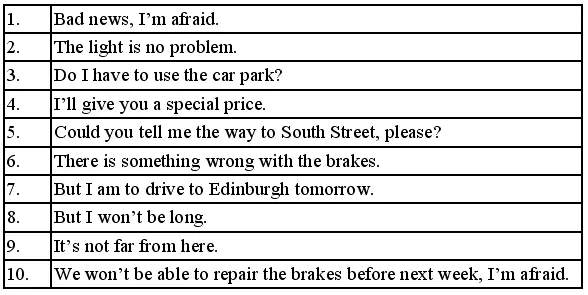
7. Read this text.
Прочитайте текст .
Mark Hill, a motorway policeman
Mark Hill is a motorway policeman. He works in a very dangerous place – on the motorway M1. He is going to speak about his work. He would also like to tell us who can and who can’t drive on the motorway.
The people who can’t are pedal cyclists, motorcyclists with a certain cc motorcycle, agricultural vehicles and learner drivers.
Policemen work in shifts. There are four shifts a day. The motorway is never safe. There are three or four accidents per shift. When there is an accident, there are three steps the police have to take. First, they must stop the traffic movement on this piece of road. Second, they must cater for any injured people. They must make sure they are safe. Then, they must clear the road as quickly as possible to enable the traffic to flow again.
Mark has a varied working day. He says he deals with numerous people from numerous walks of life. He gives some advice to learner drivers and they follow it.
A. Retell the text.
Перескажите текст.
B. Ask five questions about the text.
Задайте пять вопросов к тексту.
C. Answer the questions.
Ответьте на вопросы.
1. What’s Mark Hill’s job?
2. What does he think about his job?
3. Who can’t drive on the motorway?
4. Why is the motorway never safe?
5. What do the police do when there is an accident?
6. How many accidents happen a day?
7. Does Mark deal with learner drivers?
8. Why is Mark’s job very important?
ASSIGNMENT 5
LESSON 5
Find a mistake in each line. The first is done for you.
Найдите ошибку в каждой из строк. Первая строка дана как пример.
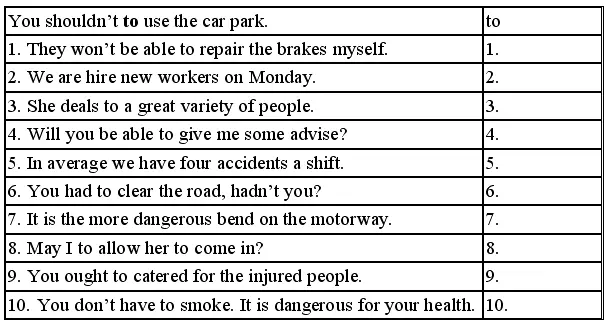
Fill in the correct words taking them from the box below.There are two extra words you don’t need.
Дополните предложения словами по смыслу. Два из данных слов лишние .
Fill, walks, varied, follow, entry, shifts, extent, safe, hurry, allow, speed, flow
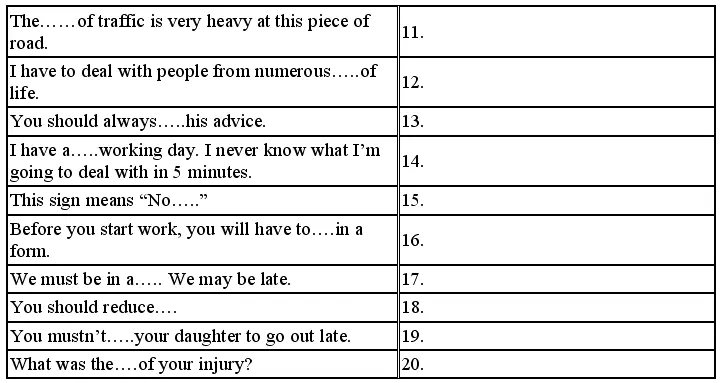
Fill in the necessary prepositions where necessary.
Вставьте нужные предлоги, где необходимо .
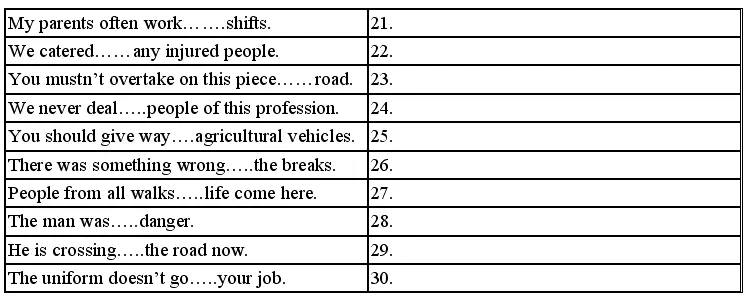
Translate the sentences.
Переведите предложения .

LESSON 6. How things work

LEAD-IN
1. Answer the questions about yourself.
Напишите ответы на вопросы о себе .
1. Do you often work with various equipment?
2. What should you do when you work with equipment?
3. What mustn’t you do when you work with equipment?
4. What equipment do you have at home/at work?
5. Do you allow your children to work with this equipment?
6. Can you describe the situation when there was something wrong with your equipment?
7. Who always repairs the things at your house?
8. What equipment are you to buy soon?
9. What equipment may be dangerous?
10. Where do you usually buy new things for your house? Why there?
2. Say what you should do with your equipment and what you shouldn’t/mustn’t do. Use the verbs given.
Скажите, как Вы должны обращаться с оборудованием и приборами, и как вы не должны поступать. Используйте данные глаголы .
To use, to place, to repair, to clean, to learn, to allow, to move, to confirm, to decide, to look at/after
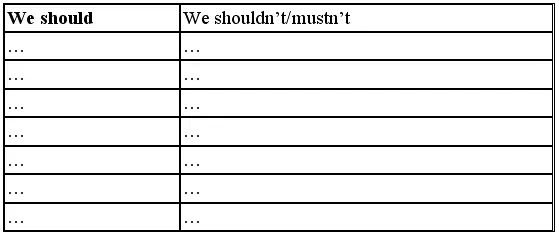
3. Complete the sentences.
Дополните предложения .
1. I won’t be able to........................................................................................
2. The pedestrians had to..................................................................................
3. Did they have to.........................................................................................?
4. The learners shouldn’t..................................................................................
5. Children mustn’t.........................................................................................
6. Passengers shouldn’t....................................................................................
7. You may...................................................................................................
8. Traffic police are to......................................................................................
9. We couldn’t...............................................................................................
10. Motorcyclists ought to.................................................................................
11. The drivers have to.....................................................................................
12. Was the firm to.........................................................................................?
13. When will you have to................................................................................?
14. Will they be able to....................................................................................?
Читать дальшеИнтервал:
Закладка:









